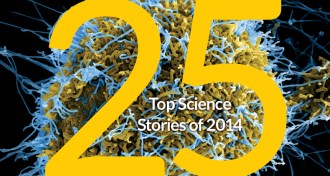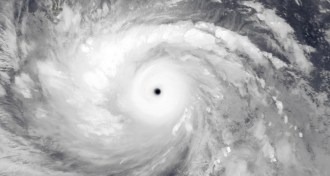Science & Society
Sign up for our newsletter
We summarize the week's scientific breakthroughs every Thursday.
-
 Chemistry
ChemistryRetraction looms for brute-force chemistry study
A 2011 study on tearing apart ring-shaped molecules is set to be retracted following a misconduct investigation.
By Beth Mole -
 Science & Society
Science & SocietyThis study of hype in press releases will change journalism
A survey of press releases and their related scientific studies shows that hype may creep from press releases to news coverage. But this doesn’t give anyone at any stage of the news cycle a pass.
-
 Science & Society
Science & SocietyEbola, Rosetta, e-cigarettes and more top stories of 2014
West Africa’s Ebola epidemic captured the attention of both the scientific world, and the world at large in 2014, placing it first among the Top 25 stories of the year.
-
 Science & Society
Science & SocietyScience’s good, bad, ugly year
In the race for Top Science Story of 2014, some of the contenders stumbled before reaching the finish line.
-
 Science & Society
Science & SocietyScience inspires awe — and arguments
As an eventful year in the sciences concludes, one that sparked both triumph and tragedy, SN's Editor in Chief contemplates 2014's most interesting stories.
By Eva Emerson -
 Genetics
GeneticsYear in review: Easy stem cells a no go
An incredibly easy method for making stem cells turned out to be impossible, again tainting the stem cell research field with controversy.
-
 Math
MathMath to match pedestrian behavior is all about timing
The best-ever simulation of pedestrians moving through a crowd relies on a new formula that encapsulates people’s ability to anticipate collisions.
By Andrew Grant -
 Science & Society
Science & SocietyMicrosoft cofounder funds new institute for cell science
The Allen Institute for Cell Science will be housed in the same building in Seattle as the Allen Institute for Brain Science.
-
 Science & Society
Science & SocietyCompassionate colleagues can help labs restart after disaster
Scientists plan for many things, but often not for disaster. Two scientists share their story of recovery after Superstorm Sandy.
-
 Health & Medicine
Health & MedicineA look back at 2013’s disasters
The Philippines, India and China each lost more than 1,000 lives in 2013 in mass calamities.
-
 Earth
EarthExhibit lays out principles for disaster-resistant structures
The National Building Museum’s ‘Designing for Disaster’ exhibit showcases the science and engineering of making disaster-resistant infrastructure.
By Erin Wayman -
 Science & Society
Science & Society‘Race Unmasked’ explores science’s racial past, present
Eugenics is far behind us, but a health historian sees few reasons to believe science is postracial.
By Bryan Bello